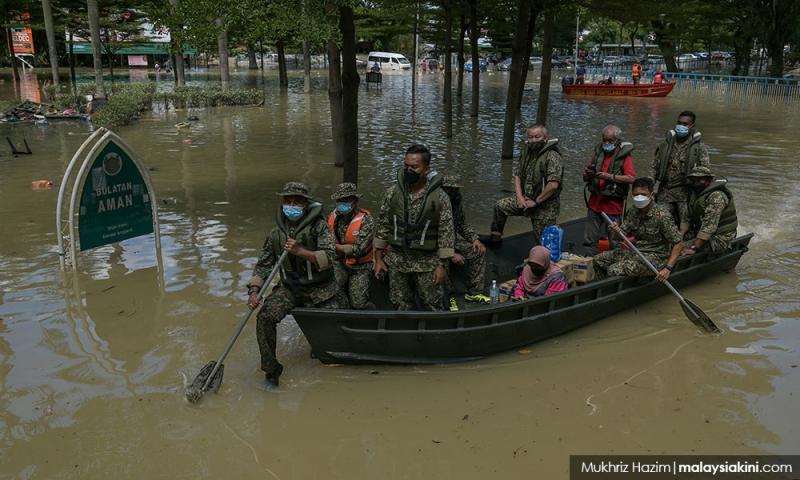
Ex-soldier recounts 1971 flood relief mission, upset with Sri Muda slow response
It was sometime in late-December 1970. The sky was pitch-black when the men from the army's 2nd Reconnaissance Regiment finished loading food rations onto their two assault boats at a small jetty in Pekan, Pahang.
The watch on the left wrist of 2nd Lieutenant Kung Boon Chin showed the time was just 10 minutes shy of 8pm. The rain that was pouring since morning showed no sign of stopping.
The Pahang river, which they were about to travel along, had overflowed and inundated several villages in the royal town.
The soldiers, clad in their 'celoreng' uniform, knew it was risky for them to travel by boat in the darkness, especially when many pieces of wood and uprooted trees were being carried along by the flood.
But they had a responsibility to fulfil - sending rations to flood victims who have been seeking refuge at several temporary relief shelters after losing their homes to the raging flood, which turned out to be one of the worst the country had seen in decades.
"We were supposed to deliver food and other supplies to villagers who we moved to higher ground before the flood started.
"It was dangerous to travel, especially at night. But we had no choice. Postponing our mission would mean that the flood victims would go hungry when we have promised to help them.
"So, armed with only torchlights to show the way, we slowly travelled the Sungai Pahang and manoeuvred through the flood and debris," Kung said during a recent interview with Malaysiakini.
Kung, who retired 10 years later with the rank of captain, was reminiscing the days when he played a part in one of the country's worst floods that displaced tens of thousands of people and killed more than 20 across several states, including Kuala Lumpur and Pahang.
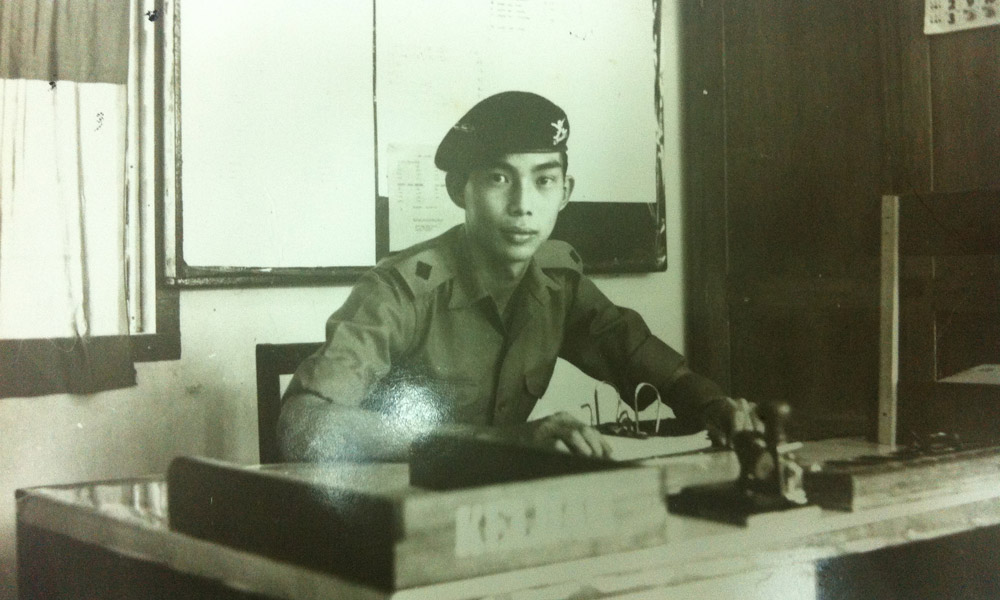
Kung Boon Chin, as a 2nd Lieutenant in 1970
Now a businessperson, he spoke to Malaysiakini recently to share his experience after seeing the slow rescue efforts during the flood in Taman Sri Muda, Shah Alam.
Cut off from outside help
According to Kung, his team of 26 soldiers was at one point cut off from outside help after the Temerloh old bridge was swept away by the flood.
This left them and the local police force, together with some civil servants under the Pekan District Office, to manage several thousand flood victims.
Besides having limited manpower and rescue equipment, they also faced another problem - their already short supply of food was running out.
"Back then, the military also did not have as many helicopters as today. And even those we had could not fly in due to the bad weather condition.
"So, when our food supply was running out, we were thinking how to get enough so that all the victims would not starve.
"This was when the district officer and I decided that we should borrow items such as rice and canned foods from the sundry shops around Pekan.
"We had to do this and promised the shops that the government will pay them back later. Because the supply we had could not last us even for several days."
Kung's role in the flood relief operations in Pekan earned him the 'Kepujian Perutusan Keberanian' award, which is a recognition given by the government to members of the Armed Forces and police.
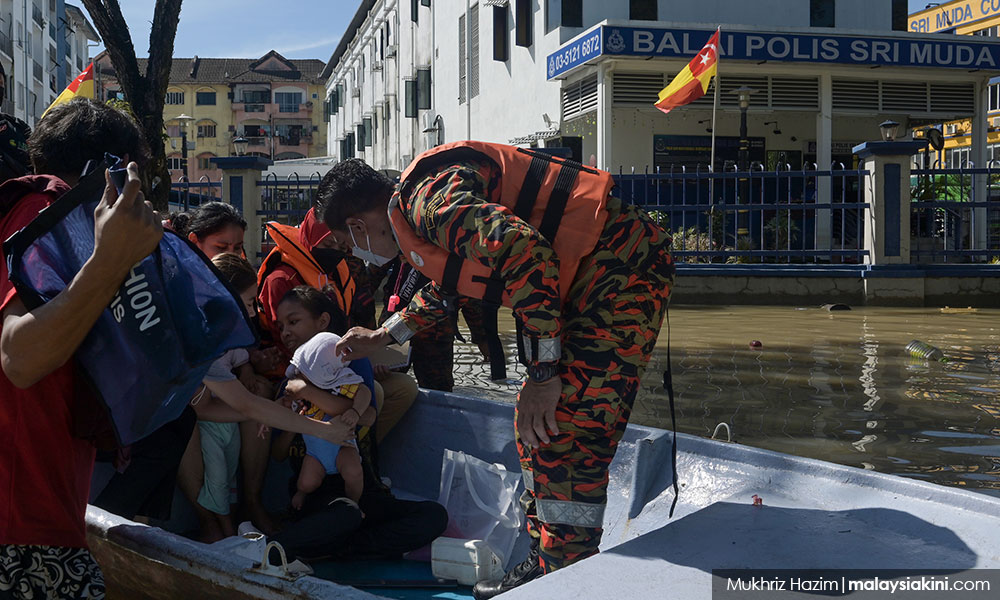
The veteran believes the award came from a recommendation by the then prime minister Abdul Razak Hussein, based on the sayings of the villagers who saw what his team did during the disaster.
According to Kung, the then prime minister, who was also the Pekan MP, returned to his constituency to observe the flood situation and render assistance to villagers stricken by the disaster.
This was when he had the chance to brief Razak, who demanded a no-holds-barred briefing on the real situation.
Political help
"I told the PM that from our regiment’s assessment, the flood situation was going to get worse despite the weather forecast saying that weather would improve because the first day of the Chinese lunar calendar is close approaching and the tide from the sea would be coming into the Pekan area - so the floodwater would not be able to flow out to the sea.
"The prime minister was very concerned and he asked me what I needed. I told him that we did not have enough food, tents, manpower and boats to help the villagers. We needed the reinforcements quickly," Kung said.
He added that Razak then thanked his team for their work and promised to send reinforcements as soon as possible.
To Kung's surprise, he was later contacted by a British warship, HMS Sir Lancelot, which was ordered to send aid to Pekan.
According to him, the assistance came following a request made by the Malaysian government to the British government.
The British warship deployed its troops together with their helicopters and rubber dinghies to send food supplies. They also helped with the evacuation of victims and rendered medical treatment.
Now a businessperson, he spoke to Malaysiakini recently to share his experience after seeing the slow rescue efforts during the flood in Taman Sri Muda, Shah Alam.
Cut off from outside help
According to Kung, his team of 26 soldiers was at one point cut off from outside help after the Temerloh old bridge was swept away by the flood.
This left them and the local police force, together with some civil servants under the Pekan District Office, to manage several thousand flood victims.
Besides having limited manpower and rescue equipment, they also faced another problem - their already short supply of food was running out.
"Back then, the military also did not have as many helicopters as today. And even those we had could not fly in due to the bad weather condition.
"So, when our food supply was running out, we were thinking how to get enough so that all the victims would not starve.
"This was when the district officer and I decided that we should borrow items such as rice and canned foods from the sundry shops around Pekan.
"We had to do this and promised the shops that the government will pay them back later. Because the supply we had could not last us even for several days."
Kung's role in the flood relief operations in Pekan earned him the 'Kepujian Perutusan Keberanian' award, which is a recognition given by the government to members of the Armed Forces and police.

The veteran believes the award came from a recommendation by the then prime minister Abdul Razak Hussein, based on the sayings of the villagers who saw what his team did during the disaster.
According to Kung, the then prime minister, who was also the Pekan MP, returned to his constituency to observe the flood situation and render assistance to villagers stricken by the disaster.
This was when he had the chance to brief Razak, who demanded a no-holds-barred briefing on the real situation.
Political help
"I told the PM that from our regiment’s assessment, the flood situation was going to get worse despite the weather forecast saying that weather would improve because the first day of the Chinese lunar calendar is close approaching and the tide from the sea would be coming into the Pekan area - so the floodwater would not be able to flow out to the sea.
"The prime minister was very concerned and he asked me what I needed. I told him that we did not have enough food, tents, manpower and boats to help the villagers. We needed the reinforcements quickly," Kung said.
He added that Razak then thanked his team for their work and promised to send reinforcements as soon as possible.
To Kung's surprise, he was later contacted by a British warship, HMS Sir Lancelot, which was ordered to send aid to Pekan.
According to him, the assistance came following a request made by the Malaysian government to the British government.
The British warship deployed its troops together with their helicopters and rubber dinghies to send food supplies. They also helped with the evacuation of victims and rendered medical treatment.
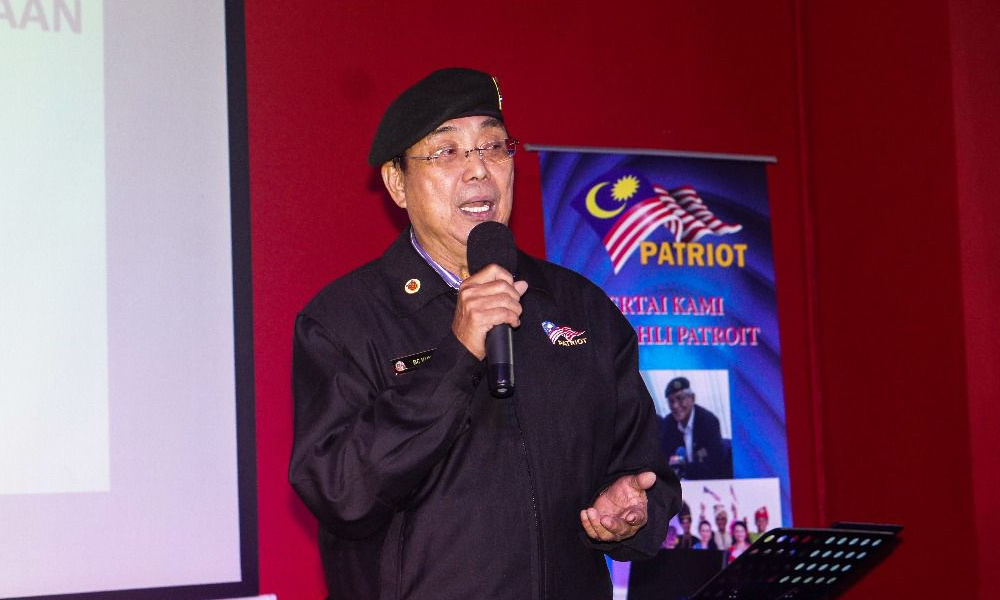
Kung Boon Chin is disappointed with how the recent floods were handled.
Lessons to learn
When relating his experience handling flood response operations, Kung could not hide his disappointment with how things were done during the recent flood in Selangor, particularly in the Sri Muda area.
He questioned the preparedness level of the government agencies in charge of disaster management, which he said could have been improved.
Back in 1971, Kung said, the flood only hit towards the second half of December but soldiers had been told to make preparations way ahead.
Those who were in Kuantan, like him and his men, had their leaves frozen as early as November and were put on standby.
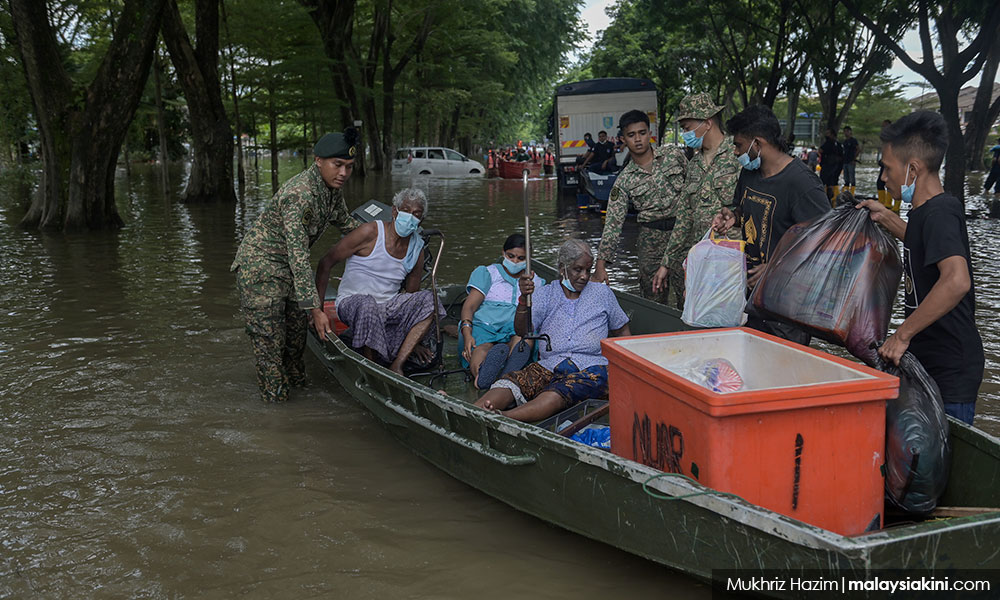
"All preparations that could be made beforehand, we did. These included checking flood relief operation stores, our assault boats, outboard motors, life jackets, radio sets, field rations, medical kits, safety ropes, tents and even loud hailers.
"Flood-prone areas were identified on our maps, and some detachments from our regiment were sent early on to monitor the situation and liaise with other government agencies to plan for flood relief missions.
"We even kept a record of daily weather monitoring."
Kung said his team was sent in before the flood started, and they began evacuating villagers ahead of the disaster.
The authorities should not wait to evacuate victims when they are already sitting on top of their roofs to escape the floodwaters, he stressed.
Kung also suggested that disaster response jobs be returned to the Armed Forces and police, which he said have enough assets and experience to do the job.
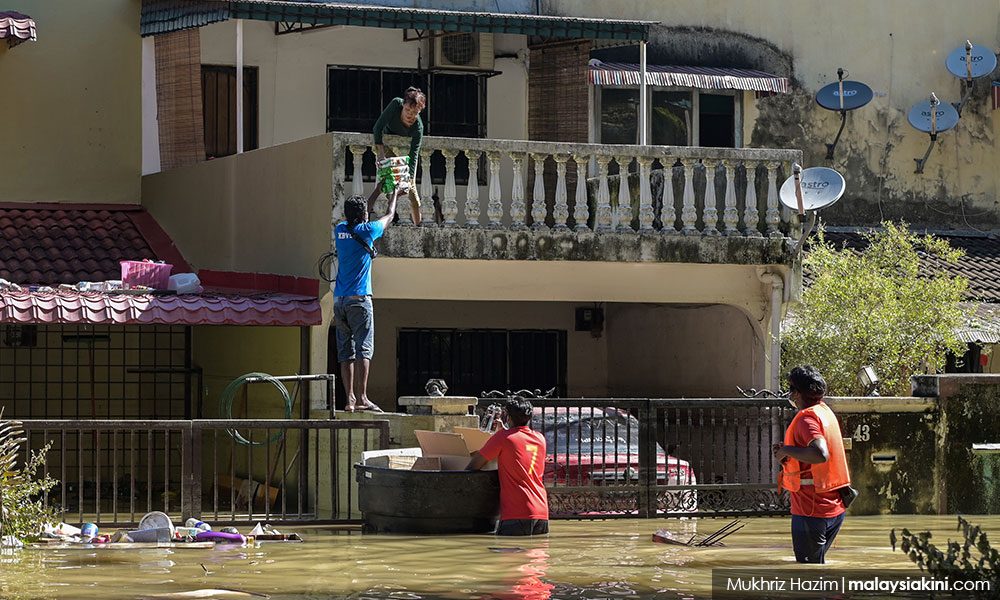
"We should not have politicians in command of disaster operations. It would be a disaster to do this.
"Politicians can receive a briefing about operations, but the command itself should be left to the men in uniform because they would know what to do and how to do it," he said.
Kung said the government should also revisit its flood mitigation programmes and engage the locals in their planning.
He said the locals would know better about the situation and can advise the government accordingly.
"We cannot stop the rain and disaster from happening, but we can always be better prepared to make sure the people do not suffer," he said.
Lessons to learn
When relating his experience handling flood response operations, Kung could not hide his disappointment with how things were done during the recent flood in Selangor, particularly in the Sri Muda area.
He questioned the preparedness level of the government agencies in charge of disaster management, which he said could have been improved.
Back in 1971, Kung said, the flood only hit towards the second half of December but soldiers had been told to make preparations way ahead.
Those who were in Kuantan, like him and his men, had their leaves frozen as early as November and were put on standby.

"All preparations that could be made beforehand, we did. These included checking flood relief operation stores, our assault boats, outboard motors, life jackets, radio sets, field rations, medical kits, safety ropes, tents and even loud hailers.
"Flood-prone areas were identified on our maps, and some detachments from our regiment were sent early on to monitor the situation and liaise with other government agencies to plan for flood relief missions.
"We even kept a record of daily weather monitoring."
Kung said his team was sent in before the flood started, and they began evacuating villagers ahead of the disaster.
The authorities should not wait to evacuate victims when they are already sitting on top of their roofs to escape the floodwaters, he stressed.
Kung also suggested that disaster response jobs be returned to the Armed Forces and police, which he said have enough assets and experience to do the job.

"We should not have politicians in command of disaster operations. It would be a disaster to do this.
"Politicians can receive a briefing about operations, but the command itself should be left to the men in uniform because they would know what to do and how to do it," he said.
Kung said the government should also revisit its flood mitigation programmes and engage the locals in their planning.
He said the locals would know better about the situation and can advise the government accordingly.
"We cannot stop the rain and disaster from happening, but we can always be better prepared to make sure the people do not suffer," he said.
*********
kt comments:
My uncles were involved in the military efforts in flood relief in that time. It has to be said that even the Yanks sent aid [many many assault (infantry) boats, food, etc] and a couple of Huey choppers from South Vietnam. In fact one Uncle said the Yanks provided more substantial aid than the Poms, though one in need must never criticised aid no matter in what quantum or degree - every bit counts.
Our air force in KL flew umpteen transportation flights in virtually 100% instrument conditions to Kuantan, then the main relief centre for the Air Force, conveying troops, policemen, food, equipment, fuel, medical supplies. The pilots then were very young yet braved the rotten flying conditions that might have even grounded birds. But the RMAF radar at Kuantan Base, manned by equally young air traffic officers, was magnificent in guiding the planes down to the base in almost zero visibility conditions.

Caribou even landed on stretches of unflooded roads and tracks to pick up stranded people

Dart Heralds were then the RMAF main transport planes
From there, again young RMAF helicopter pilots flew the relief aid and men to the strategically pre-determined) relief locations in Pahang, Terengganu (and Kelantan?) countrysides. Young fighter pilots who were grounded because their fighter planes had no role in flood relief acted as coopted navigators for the USAF Huey flights - the country topography was useless for foreign pilots relying only on maps as the floods were frighteningly extensive and masked navigational features. The local pilots knew where was where from mere glimpses of notable (not yet completely submerged) landmarks.

Work horse of the RMAF - Sikorsky S61 did magnificently in the 1971 floods

Alouette III was everywhere supporting flood relief work
Yes, the RMAF was then a very young air force with young pilots but not lacking in its sterling performance. Even today I salute those magnificent servicemen.
[a little aside - Unc told me a rather humorous story - due to the floods, RMAF Kuantan ran out of water, so the air force men cooked their rice in beer which they had plenty, wakakaka]
Indeed the military and police performed magnificently in the 1971 flooding.
What Lt Kung said (above) are all true in that each and every year (until eff-ing recent years, perhaps starting from the early 1980's, when our ministers and public institutions were more interested in making money than looking after the public) that the military (Army, Navy, Airforce) and Police were all ready for the floods way before the rainy seasons. The SOPs were read again and again, checklists ran through diligently and equipment readied.
一蟹不如一蟹!
ReplyDeleteThat's the regressive progression of the bolihland developments under the ketuanan zero-sum narratives!